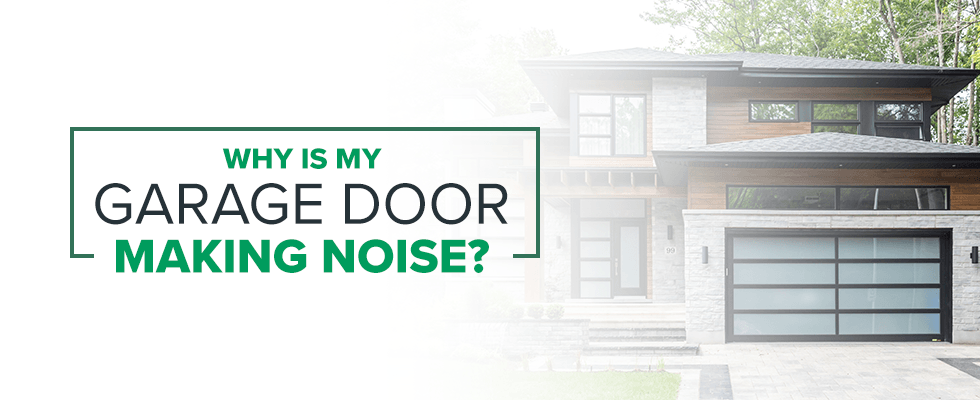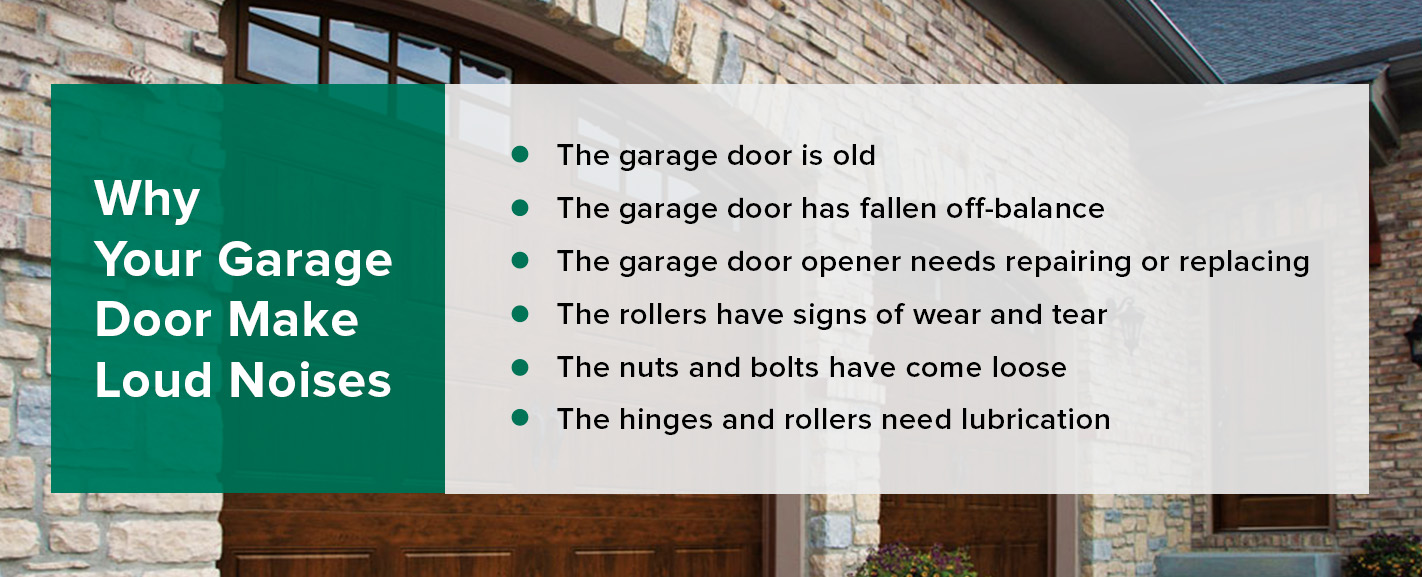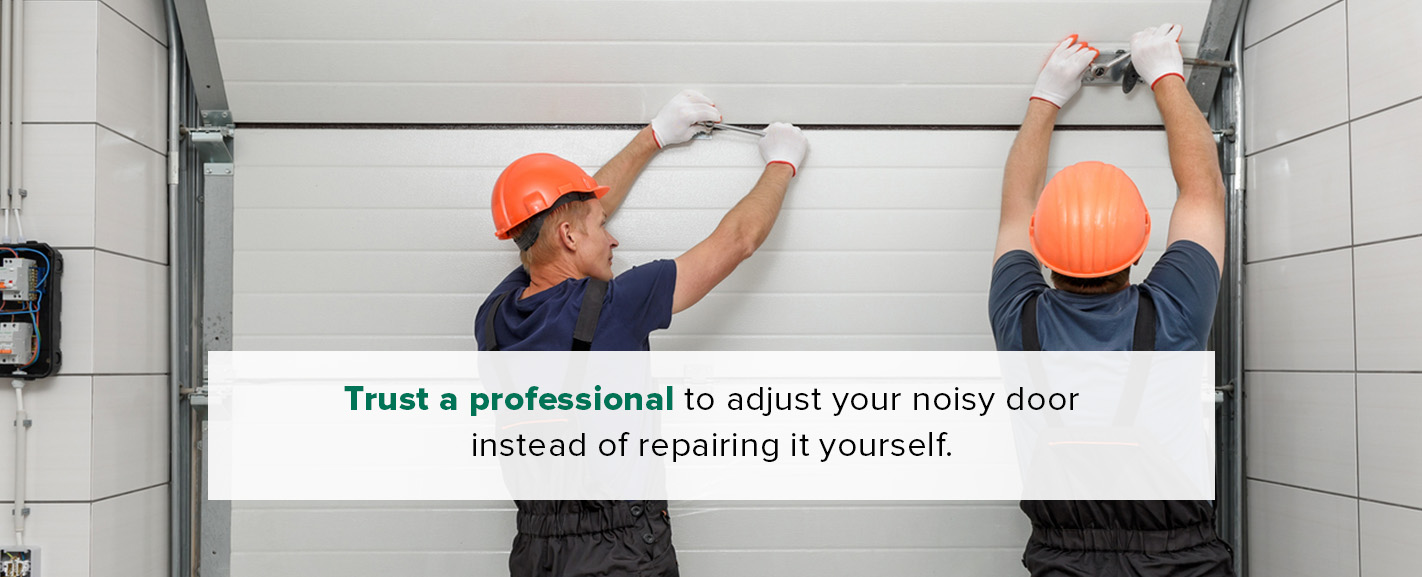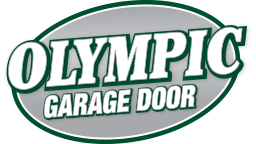Why Is My Garage Door Making Noise?

A well-maintained and high-quality garage door should run smoothly and quietly. Over time, however, even the best doors inevitably face wear and tear that can lead to strange noises. Dealing with a loud garage door? Try some of these tips to identify the issue and troubleshoot a solution.
- What Kind of Noise Is My Garage Door Making?
- Why Does My Garage Door Make Loud Noises?
- How Can I Fix My Loud Garage Door?
- Let Olympic Garage Door Repair Your Noisy Garage Door
What Kind of Noise Is My Garage Door Making?
Does your garage door make a loud noise when you’re opening it? From banging sounds to subtle rattling, there are all kinds of sounds that can come from your garage door — and they often indicate different issues.
Listen closely to help identify exactly what sound you’re hearing and what it means.
- Banging: A banging sound means your door is likely off its track and that it’s time to either carefully put it back on or replace your garage door panels entirely.
- Straining: If your door is straining to open or close, you might need to consider replacing the motor in your garage door opener. Straining might also mean you don’t have enough power in your garage. Beyond the straining noise, another common indicator that your motor’s out of juice includes slow door movement.
- Rattling: A rattling noise may mean you need to tighten some loose nuts or bolts, lubricate the door’s metal moving parts or put the garage door back on its track. The door opener’s support rails or chain might be loose as well.
- Scraping: A scraping sound is more severe than banging or rattling because it means the door is scraping against your house, and it usually means your garage door is unbalanced. Other signs of an unbalanced door that often pair with scraping noises include uneven appearance, slow response time or inability to open.
- Rumbling: A deep rumbling noise could mean a spring or coil has become loose. Call a garage door technician to tighten any tension springs in your garage door system.
- Squeaking: A squeaking sound could signal that a hinge or roller is loose. Lubricate the rollers and tighten loose parts to get rid of the noise.
- Loud opening and closing: If your door makes loud noises when you open or close your garage door, you may have poor acoustics in your garage. Install some insulation on the walls for added soundproofing to keep the noise contained.
- Clinking: A clinking sound is often due to rust buildup, which causes spring coils to rub together.
- Popping: What can cause your garage door to make a popping noise? Often, it means a torsion spring has snapped. Request a professional repair service to replace the torsion spring.
- Rubbing: Bent tracks or tracks that are too tight produce a rubbing sound. A garage door specialist would need to adjust the alignment of your garage door.
- Squealing: A squealing sound comes from poor lubrication. If you lubricate your moving parts and you still hear a squealing noise, call a professional. You may need to have the door reinstalled or put back in place on the track.
- Grinding: When a hinge or roller gets loose, it can cause a loud grinding noise. To fix this, try lubricating your garage door parts. If the trolley is stripped out or not installed properly, it’s time to call in the professionals for a bigger repair.
- Slapping: A loose chain could make a slapping sound against the garage door opener.
- Vibrating: If you notice a vibrating noise, tighten the loose nuts or bolts around the track. You can also try lubricating or replacing the rollers.

Why Does My Garage Door Make Loud Noises?
You’ve identified exactly what kind of curious sounds are coming from your garage. Now, it’s time to figure out why. Different sounds can indicate different issues, whether your garage door bangs when opening or makes a grinding noise after closing.
Here are some common reasons you have a noisy garage door:
- The garage door is old: As they get older, garage doors tend to get louder, too. Often, the culprit is old door rollers that need to be replaced or freshly lubricated.
- The garage door has fallen off-balance: An off-track garage door will make itself known with loud noises whenever it opens and closes. A professional garage door company like Olympic Garage Doors can pay a visit to realign your door.
- The garage door opener needs repairing or replacing: Hearing a rattling noise in your door? This likely indicates a problem with the opener, like the chain or belt becoming loose.
- The rollers have signs of wear and tear: Metal garage door openers often get rusty over time, increasing their noise. If lubrication doesn’t help, it might be time to schedule a maintenance check with the professionals.
- The nuts and bolts have come loose: If you notice a loud screeching noise when opening or closing your garage, a loose nut or bolt may be the cause.
- The hinges and rollers need lubrication: Lubrication is key to keeping your garage door moving smoothly and quietly. Adding some lubricant to all metal garage door pieces can help fix this in a flash.

How Can I Fix My Loud Garage Door?
While your garage door will always welcome you home with some level of noise, there are steps you can take to quieten any sounds that have gotten out of hand. Just be sure to disengage the automatic setting while you’re inspecting and repairing the garage door. Keep in mind, though, that if your garage door won’t open or close, or if it has fallen off the track, you could get hurt while trying to fix it. Trust a professional to adjust your noisy door instead of repairing it yourself.
You can try these strategies on your own to reduce any garage door noises:
- Tighten nuts and bolts: Break out the wrench and screwdriver to tighten any bolts and nuts along your garage door track. Be careful not to over-tighten them or you could end up stripping the lag screw holes. If you have a chain drive opener, you can also consider switching to a belt drive opener instead for an invariably quieter approach.
- Lubricate or replace the rollers: Rusty metal garage door rollers make a vibrating sound as they move. Lubricating your rollers and surrounding hinges will help calm the noise. You can use the lubricant supplied by your manufacturer or one like it.
- Lubricate or replace the torsion and extension springs: The torsion spring is above a closed garage door. The extension spring is by the tracks on each side of the door. Before using lubricant, inspect your springs to make sure they didn’t snap. If they’ve snapped, it’s time to request a professional service to replace your springs. If not, lubricate the springs with the spray from your door’s manufacturer. Use caution when manipulating these springs. If they snap, they could be a safety hazard.
- Inspect the garage door opener: If you’ve looked over the garage door and still can’t locate the source of the noise, check the garage door opener. Follow the instruction manual for how to reduce noise from the garage door opener. A loose chain or belt could cause a rattling or slapping sound. Contact your garage door manufacturer to inspect your opener if the belt or chain is slack. If it’s intact, lubricate it with the lubricant they gave you.
- Regular maintenance checks: After doing a thorough inspection yourself, the garage door still might make noise. Call in a professional to inspect and replace any damaged parts. Schedule an appointment to have your garage door checked annually to prolong its life.
Let Olympic Garage Door Repair Your Noisy Garage Door
Our local professionals at Olympic Garage Door are experts in installing, maintaining and repairing garage doors. We perform work throughout the Olympic Peninsula for residents and commercial businesses in Port Angeles, Sequim and Port Townsend. If you’re looking for a solution for your noisy garage door, we’re here to help you tackle any existing noise and keep your garage door operating smoothly in the future. Contact us online to request service to safely and quickly address any door noise issues, or call us at 360-452-3859.

